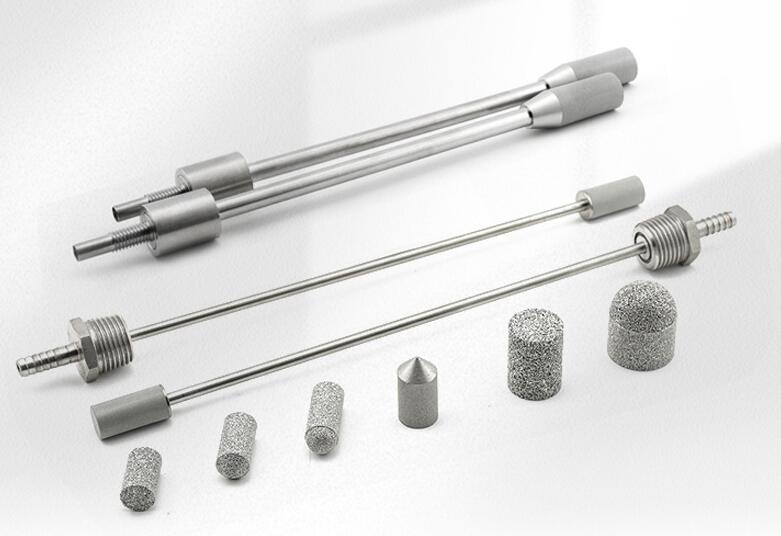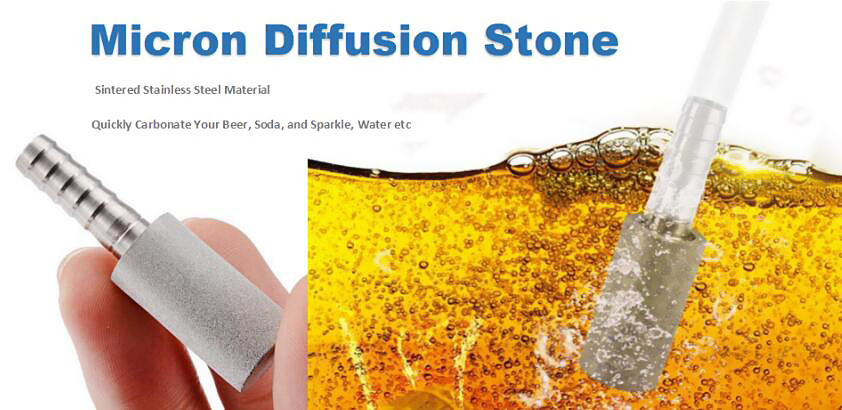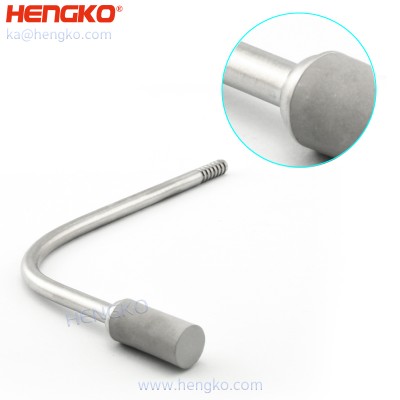
Why HENGKO Aeration Stone Brewing
◆ Durable -- Made of 316 stainless steel, Anti-corrosion, High temperature resistant and durable
◆ Not Easy Blocking -- Millions of tiny pores make it can carbonation beer and soda prior to
fermentation quickly, the micron stone is ideal to force carbonate your kegged beer or as an
aeration stone prior to fermentation. Not easy to get clogged as long as it's ungreasy.
◆ Better Choice for Home Brewing -- A must have for Homebrewers who Carbonate in Kegs Made
of stainless steel 316, better than stainless 304. Perfect for carbonation of Beer or Soda.
◆ Easy Use -- Just you can do is to connect your oxygen regulator or aeration pump to the stainless
steel diffusion stone and aerate your wort as beer flows through the line. Connects inline with any
kettle, pump, or counterflow/plate wort chiller
◆ Wholesale Beer Carbonation Stone from Factory Directly, Factory Price , No Middle Man
◆ Supply O.E.M Beer Diffusion Stone As Your Require, Fast Design and Manufacturing about 10-30 days.

Questions Guide about the Aeration Stone Brewing
1. What is an aeration stone, and how does it work?
Aeration stone, also known as a diffuser stone or air stone, is a device commonly used in aquariums, wastewater treatment systems, and hydroponic setups to introduce air or oxygen into a liquid. It consists of a porous stone or ceramic material that allows air to pass through and disperse tiny bubbles into the liquid.
The primary function of an aeration stone is to improve the oxygenation and circulation of the liquid. When air is forced through the small pores or holes in the stone, it breaks the air into numerous tiny bubbles. These bubbles rise to the surface, creating agitation and increasing the surface area of the liquid exposed to the air.
The working principle of an aeration stone is based on the process of gas exchange. As the bubbles rise, they come into contact with the liquid, transferring oxygen from the air to the liquid. This oxygenation process is particularly beneficial in environments where the dissolved oxygen levels are low, such as in aquariums or wastewater treatment systems.
In aquariums, the aeration stone helps provide vital oxygen to fish and other aquatic organisms. It also aids in the removal of carbon dioxide and other gases, maintaining a healthy and well-oxygenated aquatic environment. Additionally, the agitation and circulation caused by the rising bubbles help prevent stagnant areas, distribute nutrients, and enhance overall water quality.
In wastewater treatment systems, aeration stones play a crucial role in the biological treatment process. The bubbles generated by the stones provide oxygen to the microorganisms responsible for breaking down organic matter in the wastewater. This promotes the growth of aerobic bacteria, which efficiently decompose pollutants and improve the treatment efficiency.
In hydroponic systems, aeration stones are used to oxygenate the nutrient solution that provides nourishment to plants. By ensuring an adequate supply of oxygen to the plant roots, aeration stones enhance nutrient uptake and stimulate healthy growth.
Aeration stones come in various shapes, sizes, and materials to suit different applications. Some stones have fine pores, producing smaller bubbles for more efficient oxygen transfer, while others have larger pores for increased water circulation. It is important to choose the appropriate aeration stone based on the specific requirements of the system or application.
So till now we know that aeration stone is a widely employed method to enhance oxygen levels, promote gas exchange, and improve the overall health and functionality of aquatic environments, wastewater treatment systems, and hydroponic setups.
2. Why is aeration important in brewing?
Aeration is an essential process in brewing that plays a crucial role in yeast health and fermentation. It involves introducing oxygen into the wort (the liquid extracted from malted grains) before fermentation begins. Aeration is important in brewing for the following reasons:
-
Yeast Reproduction: Aeration provides the necessary oxygen for yeast reproduction. During the early stages of fermentation, yeast cells consume oxygen to synthesize sterols and unsaturated fatty acids, which are vital for yeast cell membrane development and growth. Adequate yeast reproduction ensures a healthy yeast population capable of fermenting the wort efficiently.
-
Flavor Development: Aeration influences the flavor profile of the finished beer. The oxygen present during the aeration process helps create an environment conducive to the synthesis of desirable flavor compounds. Yeast requires oxygen to produce certain esters and higher alcohols, which contribute to the aroma and taste characteristics of the beer. Proper aeration techniques can result in the formation of desirable flavors, enhancing the overall quality of the beer.
-
Attenuation and Fermentation Efficiency: Oxygen availability during aeration directly impacts the yeast's ability to ferment the wort completely. A well-oxygenated wort enables the yeast to efficiently metabolize sugars, leading to better attenuation (conversion of sugars to alcohol) and higher fermentation efficiency. This results in a drier beer with a more balanced and consistent alcohol content.
-
Yeast Viability and Health: Aeration helps maintain yeast viability and health throughout the fermentation process. By providing oxygen at the beginning of fermentation, yeast cells can build up reserves of sterols and unsaturated fatty acids, which are crucial for their survival in the later stages of fermentation. Healthy yeast cells are more resilient to stress factors and produce a cleaner, more refined beer.
It is important to note that aeration is a delicate process in brewing, and excessive oxygen exposure after the initial phase can be detrimental. Oxygen ingress during later stages of fermentation can lead to off-flavors, oxidation, and premature yeast flocculation (clumping), which may affect the beer's quality. Brewers carefully control and limit oxygen exposure once fermentation is underway to avoid these issues.
Overall, you can see that aeration in brewing is essential for yeast health, fermentation efficiency, and flavor development. By providing the necessary oxygen for yeast reproduction and metabolism, brewers can optimize fermentation conditions and achieve desired flavor profiles, resulting in well-attenuated, flavorful beers.
3. How do I use an aeration stone?
To use an aeration stone, attach it to an air pump and place it in the liquid you want to aerate. The air pump will then force air through the stone, creating small bubbles that will dissolve into the liquid.
4. Can I use an aeration stone for both wort and beer?
Yes, aeration stones can be used for both wort and beer. However, it is generally recommended to aerate the wort before fermentation and beer after fermentation.
5. How long should I aerate my wort or beer?
The length of time you should aerate your wort or beer will depend on the specific recipe you are using. Generally, it is recommended to aerate wort for at least 15 minutes and beer for at least 5 minutes.
6. Can I use an aeration stone with all types of beer?
Yes, aeration stones can be used with all types of beer. However, certain styles of beer may benefit more from aeration than others. For example, pale ales and lagers may benefit more from aeration than darker beers like stouts or porters.
7. Do I need to sterilize my aeration stone before use?
Yes, it is important to sterilize your aeration stone before use to prevent contamination of your wort or beer. This can be done by soaking the stone in a water solution and a sanitizer, such as Star San.
8. Can I make my aeration stone?
Yes, making your own aeration stone can be made by drilling small holes into a piece of plastic or stainless steel. However, it is important to be cautious when drilling into any materials that will come into contact with your wort or beer, as it can be difficult to completely sterilize the surface.
9. How do I clean and maintain my aeration stone?
Usually, To clean and maintain your aeration stone, it is recommended to soak it in a solution of water and a sanitizer after each use. This method will help to remove any bacteria or other contaminants that may have accumulated on the stone.
10. Can I reuse my aeration stone?
Yes, you can reuse aeration stones multiple times. However, cleaning and sterilizing the stone thoroughly after each use is important to ensure that it is free of any contaminants that could affect the quality of your wort or beer.
11. How long will my aeration stone last?
The lifespan of an aeration stone will depend on how often it is used and how well it is maintained. With proper care and cleaning, an aeration stone should last for many batches of wort or beer.
12. Where can I wholesale or OEM Aeration Stone?
You can search and find HENGKO in Google to OEM Aeration stones to show your design and requirements, such as materials. We used food grade 316l stainless steel, and also the micro pore size, the pore size determines the size and density of the bubbles.
13. What is Aeration Stone ?
A simple definition for Aeration Stone has many names, and some people call diffusion stones or 'Air Stones',
which are common. Used to aerate the wort before fermentation, which helps ensure a healthy start to the
fermentation process. Diffusion Stones can be attached to compressed oxygen tanks or air pumps
(such as those used with aquariums).
14. What does a carbonation stone do ?
A carbonation stone is a device that is used to introduce dissolved carbon dioxide (CO2) into a liquid, such as beer or soda. It is typically made of stainless steel or ceramic and has a porous surface that allows CO2 to be infused into the liquid as it passes over the surface of the stone.
15. How long does it take to carbonate beer with a carbonation stone ?
The time it takes to carbonate beer with a carbonation stone will depend on a number of factors, including the size of the stone, the temperature of the beer, and the desired level of carbonation. In general, it can take anywhere from a few days to a few weeks to fully carbonate beer using a carbonation stone.
16. What size carbonation stone do l need?
The size of the carbonation stone you need will depend on the volume of liquid you want to carbonate and the level of carbonation you desire. A larger stone will be able to infuse more CO2 into the liquid more quickly, while a smaller stone will take longer.
17. How long does a carbonation stone last?
Carbonation stones can last for a long time, as long as they are properly cared for. To extend the life of your carbonation stone, be sure to clean it regularly and avoid exposing it to extreme temperatures.
18. Do beer stones work?
Beer stones, which are also known as "carbonation stones," do work to carbonate beer. They are an effective way to infuse CO2 into the liquid, which can help to improve the flavor and mouthfeel of the beer.
19. How do you clean carbonation stones?
To clean a carbonation stone, simply rinse it with hot water and allow it to dry completely before using it again. You can also use a solution of water and a mild detergent to remove any built-up residue. Do not use abrasive cleaners or scouring pads on the stone, as this can damage the surface.
20. Can you boil a carb stone?
To clean a carbonation stone, simply rinse it with hot water and allow it to dry completely before using it again. You can also use a solution of water and a mild detergent to remove any built-up residue. Do not use abrasive cleaners or scouring pads on the stone, as this can damage the surface.
21. What is a diffusion stone?
A diffusion stone is a device that is similar to a carbonation stone, but it is designed to be used in a pressurized system, such as a keg, to infuse CO2 into the liquid. It works by releasing a fine mist of CO2 bubbles into the liquid, which helps to evenly distribute the gas throughout the liquid.
22. How do you use a spike carb stone?
A diffusion stone is a device that is similar to a carbonation stone, but it is designed to be used in a pressurized system, such as a keg, to infuse CO2 into the liquid. It works by releasing a fine mist of CO2 bubbles into the liquid, which helps to evenly distribute the gas throughout the liquid.
Any other questions for Aeration Stone or Diffusion Stone , you are welcome to send email
by ka@hengko.com, also please feel free to send inquiry by follow form, we will send back
asap within 24-Hours.






